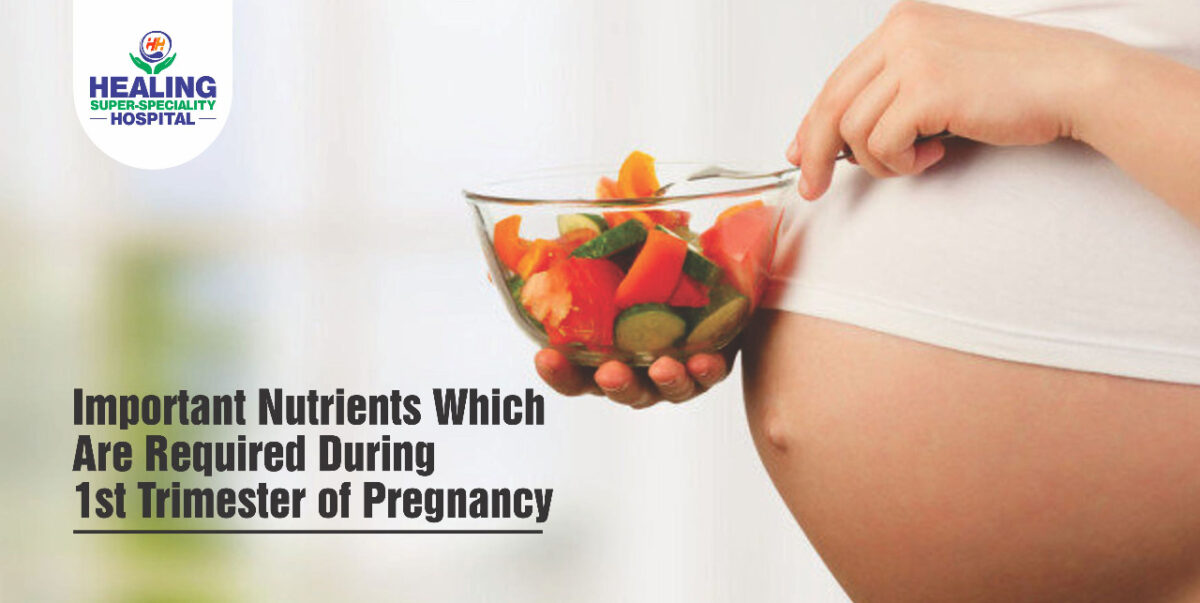It is always important to eat a well-balanced diet, but it’s especially important when you’re bringing a new life into the world. The food that you eat is your baby’s primary source of nutrients. As a result, it is important to increase the consumption of nutrients such as iron, calcium, folic acid, vitamin D and protein in your diet when you are pregnant.
In the first trimester of pregnancy, your body undergoes a surge of hormones, which can also cause nausea. Many pregnant women notice that they have no urge to consume any nutritious foods in the first trimester.
In the first trimester, you should strive to consume around 2,000 calories per day, but your gynaecologist may advise you otherwise depending on your activity level.
For the time being, don’t worry if you’re not able to eat a lot. Just try to consume some healthy foods in the first trimester so that you can get enough nutrients for yourself and your baby.
Also Read: https://healinghospital.co.in/how-to-avoid-miscarriages-tips-by-best-gynaecologist-in-chandigarh/
According to the best maternity hospital in Chandigarh, you and your baby need these essential nutrients in the 1st trimester of pregnancy:

- Calcium: Calcium aids in the development of the baby’s healthy bones and teeth. Too little calcium in your diet can lead to osteoporosis later in life. You’ll need at least 1,000 mg of calcium in a day during pregnancy.
Milk, cheese, yoghurt, and green leafy vegetables are all good sources of calcium. If you still feel short of it, you may also take supplements.

- Protein: Protein is essential for your baby’s muscle development. Approximately 75 grams of protein per day is a decent target to shoot for. Good sources of protein include eggs, greek yoghurt and chicken.
- Iron: Iron aids the red blood cells to deliver oxygen to your baby. Good sources of iron include beef, chicken, eggs, tofu, green leafy vegetables, beans, seafood and iron-fortified cereals.
The target of 27 milligrams per day can be difficult to achieve by food alone, so you should include a good amount of iron in your prenatal vitamin to avoid pregnancy anaemia.
- Folic Acid: Folic acid is essential for blood and protein production. It also lowers the likelihood of neural tube defects in the baby. Green leafy vegetables, bananas, oranges, legumes, cauliflower, fortified breakfast cereals, and nuts are all high in folic acid.
To minimise the risk of neural tube defects, you must consume at least 400 micrograms
of folic acid daily before conception and during the first 12 weeks of pregnancy.
- Vitamin D: Vitamin D supports the absorption of calcium, which helps in the development of your baby’s bones and teeth. Sunlight, fortified milk, and fish are all good sources. You’ll need 600 IUs per day while you are pregnant.
- Potassium: Potassium works hand in hand with sodium to keep the body’s fluid balance in check while also regulating blood pressure. Use your prenatal vitamin and foods like bananas, apricots, and avocados to get 2,900 milligrams of potassium in a day.
- Omega 3 Fatty Acids: Omega-3 fatty acids can be found in fish, chia seeds, flax seeds, and fortified foods. DHA is a crucial omega-3 fatty acid which is present in anchovies, herring, and sardines.
You may or may not be able to eat seafood in the first trimester, so make sure your prenatal vitamin contains DHA and omega-3 fatty acids.
Finally, while it’s important to eat well during the first trimester, you should try not to stress out too much about what you’re eating, as it can add to the anxiety. Apart from getting all these nutrients, remember to stay hydrated, keep snacking, take your prenatal vitamins daily and stay happy.
If still in doubt, book an appointment with the best maternity hospital in Chandigarh here: https://healinghospital.co.in/gynecology/
























